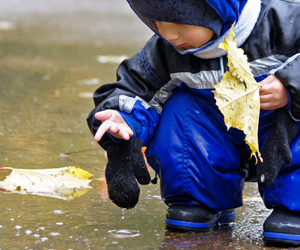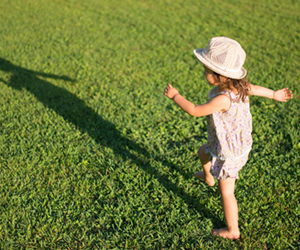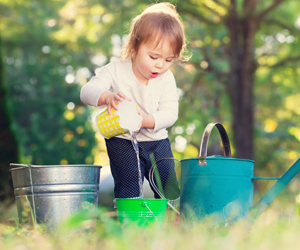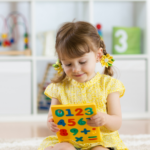
Early years science and outdoor play
What better place to explore science in early years, than outdoors where you can really bring learning to life.
Early years consultant and qualified forest school leader, Tricia Pillay, explores some of the ways in which you can explore science outdoors at your nursery.
Firstly, what is a scientific study?
In a scientific study, we use observations and experiments to understand and learn more about natural phenomena in the world.
Natural phenomena are things that we know exist because they can be seen, felt, tasted or heard such as the weather, things growing and changing, or what happens when different substances are brought together.
Your nursery children will engage in scientific learning whenever they observe these things in the world around them and when they experiment to find out more about how the world works.

How does it link to early years?
In order to develop future scientists, technicians, engineers and inventors we need to support our children to think for themselves and theorise about what may happen in the experiments. The more we allow children to discover things for themselves the stronger their understanding and knowledge will be.
Did you know that your children are already engaging in lots of independent scientific learning?
A baby banging a small drum with a beater will quickly notice that they can make a different sound by changing the position of the drum, or by changing the amount of force they use as they bang on the drum.
When a child uses a bathroom sink plug and leaves the tap running, they are learning about how water moves, both when it’s contained and when it moves freely.
You can channel this thirst for exploration and knowledge with the activities below.
Early years science activities for the outdoors
With a little advanced planning, you can easily support scientific learning in forest school or outdoor play sessions.
These activities require very few resources beyond what you might expect to find in your forest school setting or outdoor play area.
Remember to help children make predictions, record their findings and monitor changes they observe so that they also begin to understand the process of scientific investigation.
Utilise the weather
Different seasons offer varied opportunities for exploring the weather but, of course, there are few things as unpredictable as the weather, (in Britain particularly), so watch the weather not the season.
In sunny weather, you could explore shadows:
- Use sticks to mark the shadow of a tree or hedge
- Return an hour or two later and see if the sticks still mark the edge of the shadow. What has happened?
- If you have a big enough open space, stand still and encourage the children to see their own shadow. Where is it? In front? Behind? What does it look like?
- Come back to the same spot an hour or two later and encourage the children to talk about what has happened to their shadow
- When shadows stretch in front of the children let them take a photograph of their shadow.
- Can children tell whose shadow is on each photograph?

You could also have a go at shadow puppets. Simply stretch out a hand so that you can see the shadow very clearly (children might need to turn around to do this), then ask the children what shapes they can make with their hand shadow.
If it’s hot, you could explore evaporation.
- Pour water onto rocks or logs
- What happens to the water?
- Where does it go to?
- How does the water come back down to earth?
- Put containers of water in sunny places and shady places
- Come back an hour or two later. What has happened to the water in the different places?
- For an accurate scientific experiment use the same size containers and the same amount of water in each container
- Use a waterproof ruler to measure how far up the container the water comes
- Use wipe clean boards and marker pens for children to record how much water there is at the start, and at the end, of the experiment.
Please remember to practice sun safety at your setting when outdoors in hot and sunny weather.
In windy weather, you could have a go at making and flying your own kites.
In heavy rain, measure it:
- Put containers such as cups or saucepans in open spaces
- Come back an hour or two later and use waterproof rulers to measure how much rain is in the containers
- Is this measurement the same or different for each container?
Cloudy? Why not try and predict the weather?
- Sit back to back in a circle then lie down with heads close together
- Look at the clouds. What weather are they bringing?
- Are they hiding the sun? How are they moving?
- If you repeat this activity often, children will soon make accurate weather predictions.

Exploring chemical reactions
Create an erupting Volcano to explore chemical reactions, all you need is bicarbonate-of-soda, vinegar and mud.
- Have the children mould a mound of mud into a cone-shaped volcano
- The children can then find, and use a thick stick to make a hollow in the middle
- Pour the bicarbonate-of-soda into the hollow, then pour in some vinegar and wait for your volcano to erupt as the chemicals in the bicarbonate-of-soda and vinegar react with each other.
Extend children’s interests
Are children showing a deep interest in something, maybe dinosaurs?
Extend that interest at forest school. Take a few dinosaurs and spend the whole session building a dinosaur land, complete with rivers, dams and working volcanoes.
Let children do as much as possible for themselves, if something doesn’t work the first time they can try again another way. This way they will enjoy the challenge of persevering and the greater sense of achievement that success will bring.

This blog post was written by Tricia Pillay, early years consultant and qualified forest school leader.
- Outdoor Play
- Science



